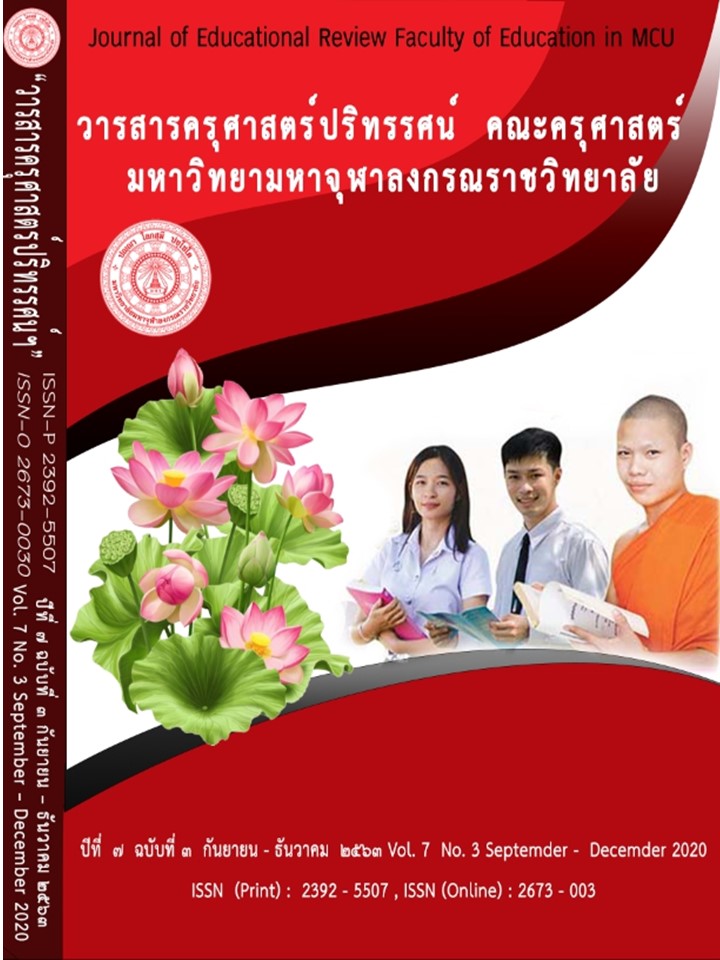AN INVESTIGATION OF 6TH GRADE STUDENTS’ ATTITUDES TOWARDS MATHEMATICS THROUGH ACTIVE LEARNING
Main Article Content
Abstract
The purpose of this research was to Investigate of 6th Grade Students’ Attitudes towards Mathematics through Active Learning. The target Group used in this research were 20 samples of 6th Grade Students in the Municipality of Wat Rattanachai School. the research instruments were the attitude towards mathematics of 6th Grade Students and the structured interview form. The statistics used for data analysis are mean and standard deviation. Content analysis. The research found that Attitudes towards mathematics of 6th Grade Students receiving proactive learning management. Overall, the students were in the highest level of satisfaction. When considering each aspect, it was found that 1) Regarding quality of learning, it was found that with good attitudes towards mathematics. Gain knowledge and skills Thought process creativity from action Feel happy Fun to learn More assertive In addition. 2) Regarding teachers, it was found that in which the students felt more interested in mathematics from the teachings of the teachers that enable students to gain knowledge and understand mathematics. Fun learning Happy to study 3) Regarding the teaching and learning media, it was found that the students learned with appropriate teaching and learning media from various learning activities that corresponds to the interests of students Including learning outside the classroom Creating a fun learning atmosphere Makes it able to learn and understand math more, and 4) Regarding the learning management process, it was found that in which the students received fun knowledge and understanding in mathematics. Have knowledge skills Developed the thinking process Know love unity and more courageous.
Article Details
ทัศนะและความคิดเห็นที่ปรากฏในบทความในวารสารฉบับนี้ถือเป็นความรับผิดชอบของผู้เขียนบทความนั้นเพียงผู้เดียว และไม่ถือเป็นทัศนะและความรับผิดชอบของกองบรรณาธิการ
กองบรรณาธิการขอสงวนสิทธิ์ในการคัดเลือกบทความลงตีพิมพ์และจะแจ้งให้เจ้าของบทความทราบหลังจากผู้ประเมินบทความตรวจอ่านบทความแล้ว
ต้นฉบับที่ได้รับการตีพิมพ์ในวารสารครุศาสตร์ปริทรรศน์ คณะครุศาสตร์ มหาวิทยาลัยมหาจุฬาลงกรณราชวิทยาลัย ถือเป็นกรรมสิทธิ์ของคณะครุศาสตร์ มหาวิทยาลัยมหาจุฬาลงกรณราชวิทยาลัย ห้ามนำข้อความทั้งหมดหรือบางส่วนไปพิมพ์ซ้ำ เว้นเสียแต่ว่าจะได้รับอนุญาตจากมหาวิทยาลัยฯ เป็นลายลักษณ์อักษร
References
คณะกรรมการการประถมศึกษาแห่งชาติ. (2543). ปฏิรูปการเรียนรู้ผู้เรียนสำคัญที่สุด. กรุงเทพมหานคร: ครุสภาลาดพร้าว.
จิตรลดา จิตรกุล. (2559). การเปรียบเทียบผลสัมฤทธิ์ทางการเรียนโดยใช้สื่อรูปธรรมเรื่อง ปริมาตร ของนักศึกษาสาขาวิชาท่องเที่ยวระดับประกาศนียบัตรวิชาชีพชั้นปีที่ 1 ห้อง 1 วิทยาลัยเทคโนโลยีพายัพและบริหารธุรกิจ. รายงานการวิจัย. วิทยาลัยเทคโนโลยีพายัพและบริหารธุรกิจ.
ไชยยศ เรืองสุวรรณ. (2553). Active Learning. แหล่งที่มา https://genedu.kku.ac.th/mainweb/New%20Site2014/activity/อบรมActiveLearningอุดร6-8มีค60/ActiveLearing68032016. html สืบค้นเมื่อ 2 ม.ค. 2563.
ดวงเดือน อ่อนน่วม และคณะ. (2536). การสร้างเสริมสมรรถภาพคณิตศาสตร์ของครูประถมศึกษา. รายงานการวิจัย. จุฬาลงกรณ์มหาวิทยาลัย.
ไมตรี อินประสิทธิ์. (2557). กระบวนการแก้ปัญหาในคณิตศาสตร์ระดับโรงเรียน. ขอนแก่น: ศูนย์วิจัยคณิตศาสตร์ศึกษา มหาวิทยาลัยขอนแก่น.
โรงเรียนเทศบาลวัดรัตนชัย. (2561). เอกสารรายงานการวิเคราะห์ผลการทดสอบระดับชาติขั้นพื้นฐาน (O-NET) โรงเรียนเทศบาลวัดรัตนชัย เทศบาลนครพระนครศรีอยุธยา. พระนครศรีอยุธยา: โรงเรียนเทศบาลวัดรัตนชัย.
วิชา สำราญใจ. (2552). ปัจจัยที่ส่งผลกับผลสัมฤทธิ์ทางการเรียนวิชาคณิตศาสตร์ของนักเรียนชั้นประถมศึกษาปีที่ 6 สำนักงานเขตพื้นที่การศึกษาเลยเขต 1. วิทยานิพนธ์ครุศาสตรมหาบัณฑิต. มหาวิทยาลัยราชภัฏเลย.
ศรัณย์ จันทร์ศรี และน้อมจิต กิตติโชติพาณิชย์. (2557). ปัจจัยที่มีอิทธิพลต่อคะแนนวิชาคณิตศาสตร์ของนักเรียนชั้นมัธยมศึกษาปีที่ 6 แผนการเรียนวิทยาศาสตร์-คณิตศาสตร์ ในสังกัดสำนักงานเขตพื้นที่การศึกษามัธยมศึกษา เขตพระโขนง. วารสารวิทยาศาสตร์ลาดกระบัง. 23(1). 62-79.
สำนักงานคณะกรรมการการศึกษาแห่งชาติ. (2545). พระราชบัญญัติการศึกษาแห่งชาติ พ.ศ. 2542 แก้ไขเพิ่มเติม (ฉบับที่ 2) พ.ศ. 2545. กรุงเทพมหานคร: พริกหวานกราฟฟิค.
อรษา เจริญยิ่ง. (2560). การพัฒนาความสามารถในการแก้ปัญหาทางคณิตศาสตร์ เรื่องคู่อันดับและกราฟ ของนักเรียนชั้นมัธยมศึกษาปีที่ 1 โรงเรียนวัดลาดหญ้าไทร (สิงหวิทยาคาร) โดยใช้การเรียนรู้แบบเชิงรุก (Active Learning). วิทยานิพนธ์ศึกษาศาสตรมหาบัณฑิต. มหาวิทยาลัยรามคําแหง.
Aiken Jr L. R. (1970). Attitudes towards mathematics. Review of Educational Research. 40(4). 551-596.
Bonwell, J.A. Eison. (1991). Active Learning: Creating Excitement in the Classroom. ERIC Digest. Washington D. C.: ERIC Clearinghouse on Higher Education.
Mc Leod, D. (1992). Research on affect in mathematics education: a reconceptualization. In Grows (Ed.), Handbook of Research on Mathematics Teaching and Learning. New York: McMillan Publishing Company.
Papanastasiou, C. (2008). A Residual Analysis of Effective Schools and Effective Teaching in Mathematics. Studies in Educational Evaluation. 34(1). 24-30.


